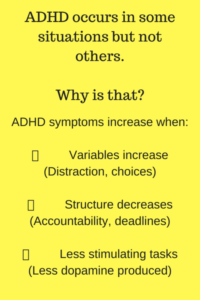According to ADHD pioneer, Ned Hallowell, M.D, education is the first step in identifying and treating ADHD. Unfortunately, we often start our education about ADHD having to overcome fear and stigma, myths, and partial, often negative information. Misunderstanding abounds. We are still learning, but reliable information is now available to help you get a good start on living well with ADHD. I share some of what I’ve learned on the last twenty years through my website and newsletter, as well as ADD freeSources’ Facebook and Pinterest pages.
 It’s important to understand that ADHD is NOT 24/7! Indeed, ADHD symptoms most often interfere in specific situations when increased variables and decreased structure leads to an absence of focus. This meme outlines what Dr. Charles Parker, author of ADHD Medication Rules proposes in his 5-minute video Reality- ADHD in Context. (Sorry, the embed link doesn’t work)
It’s important to understand that ADHD is NOT 24/7! Indeed, ADHD symptoms most often interfere in specific situations when increased variables and decreased structure leads to an absence of focus. This meme outlines what Dr. Charles Parker, author of ADHD Medication Rules proposes in his 5-minute video Reality- ADHD in Context. (Sorry, the embed link doesn’t work)
We are often SO hard on ourselves that dealing with many problems stemming from ADHD is secondary to the emotional upheaval this self-deprecation brings. One thing that really really helps is to address your ADHD symptoms with self-compassion and learn new strategies to improve your functioning. Both of the following articles do a wonderful job providing great basic information and encouragement.
16 Steps to Better Self-Esteem with ADHD by Kari Taylor Hogan
- Your first step is STRUCTURE.
By creating structure, each day, you’re giving yourself a reason to wake up and get out of bed! - The second step echoes the first step. Set up a daily to-do list. This will give you a sense of accomplishment (it gives you a reason to be proud of yourself).
- FOCUS on your good qualities. Look in the mirror and choose 5 things about yourself that you DO like about you! Write these 5 things down and tape it to the mirror (changing the 5 things each week). By choosing 5 things you do like about yourself, you’re creating hope and mindfulness that goes deep down to create an inner peace. Inner peace leads to a sense of power and in a matter of weeks, a more confident you!
- Be your own cheerleader! No one else will do it for you. Your only concern should be you. If you have to, tell yourself, “I can do this”, “I am going to do great”, “I AM worthy”.
- Learn to LIKE yourself. Meditation works wonders!! Sit in a quiet place for 10 minutes and just breathe in and exhale all of that negativity. Finish article here.
 12 Great Strategies that Help ADHers Thrive by ADHD coach Linda Walker PCC, B. Admin. takes a slightly different but still valid approach.
12 Great Strategies that Help ADHers Thrive by ADHD coach Linda Walker PCC, B. Admin. takes a slightly different but still valid approach.
- Take advantage of your strengths. Identify what you’re strong in and find ways to do more of it. Keep a journal and note down when you’ve managed to learn something particularly well. You know, when you realize “you’re a natural” at something, this is almost always an indication that you are playing to your strengths.
- Surround yourself with people who can embrace your differences and who accept you for who you are and for what you are not.
- Determine what ADHD traits aren’t going so well for you and your loved ones and consider what could change. Even though you want others to accept you, you also want to live in harmony with others. This may mean you’ll need to modify some of your behavior to reduce the negative challenges of ADHD. See complete article.
Parents, with or without ADHD themselves, are often bewildered by their child’s behavior and feel helpless to help. Traditional ways to “discipline’ and “train up your child” use methods that just plain do not work with ADHD. They don’t address their child’s needs or the way their brain’s work. Attempts at strict parenting often backfire and cause pain and estrangement for the whole family. Understanding the ADHD mind, learning to parent with empathy without taking their behavior personally, and keeping communication open is a real challenge.
I like what Kristen Mae says about her family’s journey in If Your Child Was Just Diagnosed with ADHD, Here’s What I Want You to Know “These days, ADHD is just another cog in the machinery of our lives. It’s a part of Lucas, a frustration, and an endearment at the same time. We are old pros at modifying our lives to accommodate ADHD, and we are not afraid…”
“So this is what I want to tell parents of a child with a new ADHD diagnosis: It gets better.”
The website won’t allow linking to their article. To read it in its entirety, copy and paste: https://www.babble.com/parenting/adhd-diagnosis-parent-message/
Yes, with help, you can learn to recognize those situations where ADHD symptoms are most likely to occur. Maybe even get your kids up, ready and out the door to school on time without yelling or crying. Transitions, or moving from one activity to another are often a challenge that leads to family upheaval, angry and upset parents and children.
To help with transitions, 5 simple positive parenting techniques using the anagram, S.M.I.L.E. are detailed in The Power of Positive Transitions by Melissa Fahrney.
S-Smile and take deep, slow breaths.
M- Meet them where they are.
I-Incorporate Fun!
L-Let them lead-both in the moment and in planning the transition. Ask, don’t tell.
E-Energy. If you’re smiling and breathing, you’ve started tapping into your heart energy.
To read more, copy and paste: https://impactadhd.com/organize-your-life-and-family/the-power-of-positive-transitions-smile-switch/
For a more on children and great parenting tips, see these short videos form new Vlogger ADHD Mama, AKA, Laura Von Poirier II.
Brain Development in your ADHers 3-minutes What’s going on in there and better ways to react in disconcerting situations. Understand that many of their actions and reactions reflect a delay in Executive functions or Self-regulation skills more like those of a child 30% younger.
For more parenting tips, try these 6-steps based on understanding and compassion to Help Your ADHDer with their Big Emotions (and take responsibility for their actions.) 6-minutes
Goodbye for now. Hope you’ve found useful information, new strategies, and some comfort here,
Joan Jager
(House and Family Image courtesy of Kookkai_nak/FreeDigitalPhoto.net)



